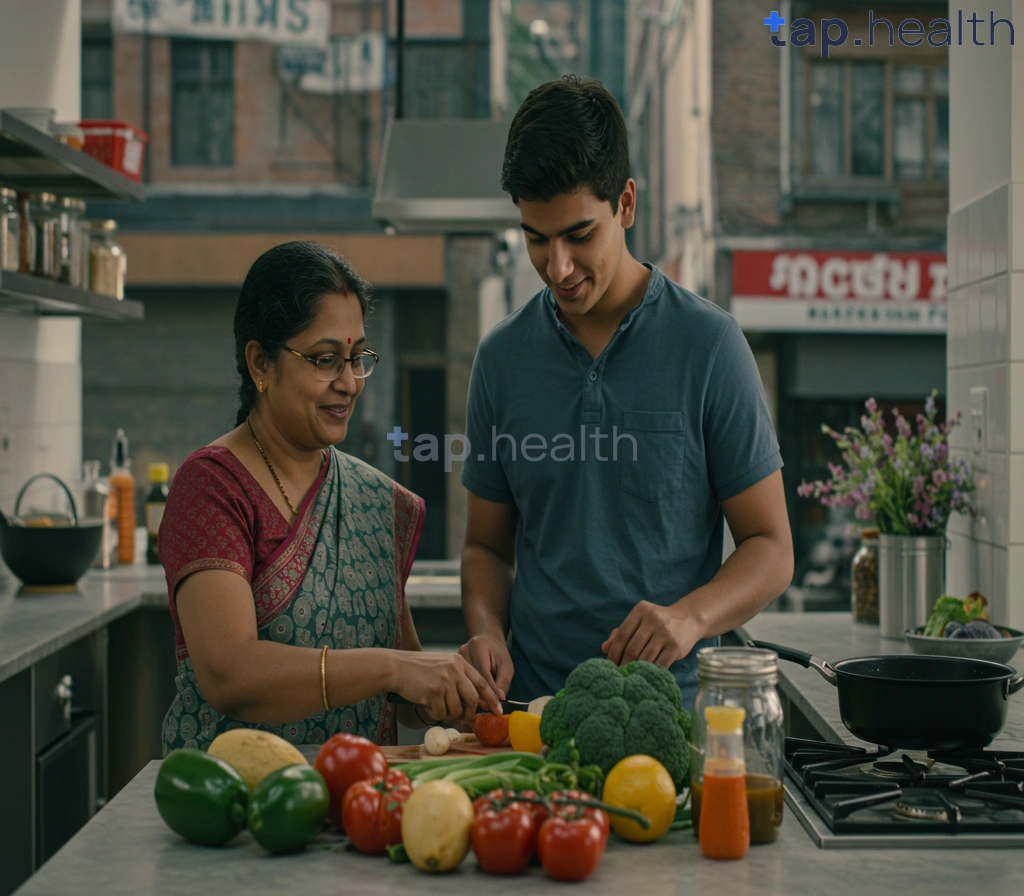Table of Contents
- Can Organic Foods Manage Diabetes? A Nutritional Guide
- Diabetes-Friendly Recipes: Organic Options for Better Health
- The Best Organic Foods to Control Blood Sugar Naturally
- Organic Eating for Diabetes: Benefits, Risks & Expert Tips
- Grocery Guide: Selecting Organic Produce for Diabetes Management
- Frequently Asked Questions
- References
Living with diabetes requires careful attention to diet, and many are turning to organic foods to help manage their blood sugar levels. But are organic options truly superior for those with diabetes? In this in-depth exploration of Diabetes & Organic Foods: A Nutritional Deep Dive, we’ll examine the science behind the claims, separating fact from fiction. We’ll delve into the specific nutrients found in organic produce and how they can impact your blood glucose control, offering practical tips and advice to help you make informed choices for a healthier lifestyle. Let’s unpack the complexities of nutrition and discover how organic eating can contribute to better diabetes management.
Can Organic Foods Manage Diabetes? A Nutritional Guide
Up to 80% of Type 2 diabetes cases can be prevented or delayed through lifestyle changes, including dietary adjustments. Research strongly supports this. This makes understanding the role of nutrition, particularly organic foods, crucial for managing diabetes, especially in regions like India and other tropical countries. A diet rich in organic produce can offer significant benefits.
Benefits of Organic Foods for Diabetes Management
Organic farming practices often prioritize whole, unprocessed foods. These foods are typically lower in pesticides and often higher in essential nutrients compared to conventionally grown counterparts. For individuals with diabetes, this translates to better blood sugar control. Organic fruits and vegetables, abundant in fiber and antioxidants, help regulate blood glucose levels and improve insulin sensitivity. Organic whole grains, like brown rice and quinoa, provide sustained energy release, preventing sharp spikes in blood sugar. Choosing organic options minimizes exposure to harmful chemicals, further contributing to overall health.
Regional Considerations in India & Tropical Countries
In India and other tropical regions, access to a wide array of fresh, organic produce is often readily available. This presents a unique opportunity to incorporate these beneficial foods into daily meals. Consider incorporating local, seasonal organic fruits like mangoes, bananas, and papaya, rich in vitamins and fiber. Similarly, leafy greens and legumes are abundant and offer valuable nutritional support. Remember to consult with a healthcare professional or registered dietitian for personalized dietary advice tailored to your specific needs and health conditions.
Actionable Steps for Better Diabetes Management
Start small by gradually incorporating more organic fruits, vegetables, and whole grains into your diet. Prioritize locally sourced produce whenever possible to maximize freshness and nutritional value. This simple shift towards a more organic, plant-based diet can play a significant role in managing diabetes and improving your overall well-being. For more in-depth strategies, check out our guide on 10 Proven Tips to Effectively Manage Diabetes | Simple Guide. Also, if you are curious about the potential of a plant-based approach, you might find our article on Can a Plant-Based Diet Reverse Diabetes? informative. Consult a nutritionist for a personalized plan to effectively manage your diabetes with organic foods.
Diabetes-Friendly Recipes: Organic Options for Better Health
Managing Blood Sugar with Organic Ingredients
Living with diabetes in India and tropical countries often means navigating a landscape rich in flavorful, but sometimes high-carbohydrate, foods. Successfully managing blood sugar levels requires careful meal planning, and incorporating organic ingredients can offer significant nutritional benefits. Remember, the recommended carbohydrate intake varies, but generally, most people with diabetes aim for 45–60 grams of carbs per meal, depending on individual needs and prescribed treatment plans. This isn’t a rigid rule, and consultation with a doctor or registered dietitian is crucial for personalized guidance.
Organic Choices for Diabetes-Friendly Meals
Prioritizing organic produce ensures you’re consuming foods with fewer pesticides and potentially higher nutrient density. For example, organically grown leafy greens like spinach and fenugreek (methi) are excellent sources of fiber, which helps regulate blood sugar. Similarly, incorporating organic whole grains like brown rice or millets, common staples in Indian and tropical cuisines, provides sustained energy without the rapid blood sugar spikes associated with refined carbohydrates. Choosing organic fruits like guava, papaya, or mango (in moderation) adds essential vitamins and antioxidants. For more ideas on specific foods to include in your diet, check out 20 Best Foods for People with Diabetes – Tap Health.
Recipe Ideas & Regional Considerations
Many traditional Indian and tropical recipes can be adapted to be diabetes-friendly using organic ingredients. Think of substituting refined white rice with brown rice in your biryani, or incorporating more vegetables into your curries. Explore using organic coconut milk (in moderation) in place of cream for a healthier twist on traditional dishes. Remember to always check food labels and be mindful of portion sizes.
Embracing Organic Living for Better Diabetes Management
Adopting organic, diabetes-friendly eating habits can significantly improve your overall health and well-being. Start small, gradually incorporating more organic produce and whole grains into your diet. Consult with a healthcare professional or registered dietitian to create a personalized meal plan that aligns with your individual needs and preferences. Explore local farmers’ markets for fresh, seasonal organic produce readily available in your region. This approach supports local farmers and ensures the highest quality ingredients for your healthy meals. And for some holiday inspiration, check out Creating Diabetes-Friendly Dishes for the Holidays for ideas on adapting your favorite recipes.
The Best Organic Foods to Control Blood Sugar Naturally
Maintaining healthy blood sugar levels is crucial, especially in regions like India and tropical countries where dietary habits significantly impact diabetes prevalence. Remember, less than 140 mg/dL is considered normal blood sugar; 140–199 mg/dL indicates prediabetes, and 200 mg/dL or higher suggests diabetes. Choosing the right foods is key to managing this. Organic options, free from harmful pesticides and chemicals, offer added benefits.
Fruits Rich in Fiber and Antioxidants
Many tropical fruits readily available in India and other tropical regions are excellent for blood sugar control. Amla (Indian gooseberry), known for its high Vitamin C content, and jamun (black plum), rich in antioxidants, are great examples. These fruits, consumed organically, help regulate blood sugar levels naturally. Other good choices include guava and papaya, readily accessible and packed with fiber which aids in digestion and prevents blood sugar spikes. For more natural remedies to help manage blood sugar, check out Top 8 Natural Remedies to Improve Blood Sugar Levels.
Nutrient-Dense Vegetables
Leafy greens like spinach and fenugreek leaves, commonly used in Indian cuisine, are powerhouses of nutrients. Organic versions minimize pesticide exposure. Bitter gourd (karela), although not everyone’s favorite, is renowned for its blood sugar-regulating properties. Incorporating these vegetables into your daily diet, prepared organically, helps maintain healthy blood sugar levels.
Whole Grains and Legumes
Opt for organically grown whole grains like brown rice and millets – staples in many Indian and tropical diets. These provide sustained energy release, preventing drastic blood sugar fluctuations. Similarly, organic lentils and beans are excellent sources of protein and fiber, crucial for blood sugar management. If you’re interested in exploring other beverage options, you might find 12 Best Juices for Diabetes to Control Blood Sugar Level helpful.
Remember to consult with your doctor or a registered dietitian before making significant dietary changes, especially if you have diabetes or prediabetes. Adopting a balanced diet rich in organic, locally-sourced produce is a vital step towards better health management in India and other tropical countries.
Organic Eating for Diabetes: Benefits, Risks & Expert Tips
Daily consumption of sugary beverages raises diabetes risk by 26%, highlighting the crucial role of diet in managing this condition. In India and tropical countries, where access to fresh, organic produce is often readily available, focusing on an organic diet can offer significant benefits for individuals with diabetes. However, it’s crucial to understand both the advantages and potential drawbacks.
Benefits of Organic Foods for Diabetes Management
Organic farming practices often prioritize lower pesticide use, potentially reducing exposure to harmful chemicals. Many organic foods are also naturally lower in refined sugars and unhealthy fats, crucial for managing blood glucose levels. Fruits like mangoes, bananas, and papayas, readily available across many tropical regions, can be incorporated into a balanced organic diet, but portion control remains essential. Focusing on whole grains, like brown rice and millets, common in Indian cuisine, provides sustained energy release, preventing blood sugar spikes.
Potential Risks and Considerations
While organic foods offer numerous advantages, it’s important to be aware of potential limitations. Organic produce can sometimes be more expensive, posing a challenge for some individuals. Furthermore, the “organic” label doesn’t automatically equate to “low in sugar” or “low in carbohydrates”. Careful monitoring of blood sugar levels remains critical, regardless of dietary choices. For further support in managing your diabetes, consider exploring safe and effective ways to supplement your diet; read more in our article on Safe and Effective Dietary Supplements for Diabetes Care.
Expert Tips for an Effective Organic Diet in Tropical Climates
Prioritize whole, unprocessed foods: Opt for organically grown fruits, vegetables, legumes, and whole grains. Embrace local produce: Utilize the abundance of fresh, seasonal organic produce available in your region. Consult a healthcare professional: A registered dietitian or endocrinologist can provide personalized guidance on creating an organic meal plan that suits your specific needs and health conditions. Monitor blood glucose levels: Regularly check your blood sugar to track the effectiveness of your dietary changes. Stay hydrated: Drink plenty of water throughout the day. By incorporating these strategies, individuals with diabetes in India and other tropical countries can leverage the advantages of organic foods to improve their overall health and well-being. It’s also important to remember that adopting an organic diet doesn’t negate the possibility of developing diabetes, as seen in our article on Can a Vegetarian Get Diabetes?.
Grocery Guide: Selecting Organic Produce for Diabetes Management
Understanding Organic Choices for Better Blood Sugar Control
Managing diabetes, especially in the age group of 20-64 years, which constitutes 61% of all people with diabetes according to the International Diabetes Federation, requires careful attention to diet. Organic produce offers potential benefits. Many tropical and Indian countries boast abundant, naturally grown fruits and vegetables, perfect for incorporating into a diabetes-friendly diet. Choosing organic reduces exposure to pesticides, which some studies link to increased inflammation and insulin resistance. For people aged 65+, the remaining 39% of the diabetic population, prioritizing nutrient-dense, organic options is crucial for maintaining health and managing blood sugar levels.
Prioritizing Key Organic Produce
Focus on organic varieties of fruits lower in the glycemic index (GI), such as berries, guava, and citrus fruits, readily available across many Indian and tropical regions. Similarly, leafy greens like spinach, kale, and amaranth, rich in fiber, are excellent choices. Remember that even organic produce should be consumed in moderation as part of a balanced diabetic diet. Consider incorporating bitter melon, a staple in many Indian and Southeast Asian cuisines, known for its potential blood-sugar-regulating properties. For more tips on managing your diabetes effectively, check out our guide: 10 Proven Tips for Effective Diabetes Management.
Tips for Organic Grocery Shopping in Tropical and Indian Climates
When shopping for organic produce in your local market, look for certifications or labels that guarantee organic farming practices. Prioritize locally sourced organic products to reduce your carbon footprint and ensure freshness. Remember to wash all produce thoroughly before consumption, regardless of whether it’s organic. Building a relationship with local organic farmers can provide access to fresh, seasonal produce, contributing significantly to effective diabetes management. Making smart fruit choices is also key; learn more about the 5 Best Fruits For People with Diabetics.
Frequently Asked Questions on Diabetes & Organic Foods: A Nutritional Deep Dive
Q1. How can organic foods help manage diabetes?
Organic foods, especially those grown locally, may offer benefits in diabetes management. They tend to be lower in pesticides and potentially richer in nutrients like fiber and antioxidants. These can help improve blood sugar control and provide sustained energy.
Q2. What are some examples of organic foods beneficial for diabetics?
Many organic options are helpful! Good choices include amla, jamun, guava, papaya, spinach, fenugreek, brown rice, millets, and lentils. Remember to focus on fruits, vegetables, and whole grains.
Q3. Does eating organic food automatically mean lower blood sugar?
No, the ‘organic’ label doesn’t guarantee lower sugar or carbohydrate content. Portion control is still essential, and you must consider the carbohydrate content of the food. Always monitor your blood sugar levels.
Q4. How should I incorporate organic foods into my diabetes management plan?
Gradually introduce locally sourced organic fruits, vegetables, and whole grains into a balanced diet. It’s crucial to consult with your doctor or a registered dietitian to create a personalized plan that works for you and your specific health needs and prescribed medications.
Q5. Are there any limitations or concerns about relying on organic foods for diabetes control?
While organic foods offer potential benefits, they are not a standalone solution. Maintaining a balanced diet, regular exercise, and consistent monitoring of blood sugar levels remain crucial. Always follow your healthcare professional’s advice.
References
- A Practical Guide to Integrated Type 2 Diabetes Care: https://www.hse.ie/eng/services/list/2/primarycare/east-coast-diabetes-service/management-of-type-2-diabetes/diabetes-and-pregnancy/icgp-guide-to-integrated-type-2.pdf
- What is Diabetes: https://www.medschool.lsuhsc.edu/genetics/docs/DIABETES.pdf




